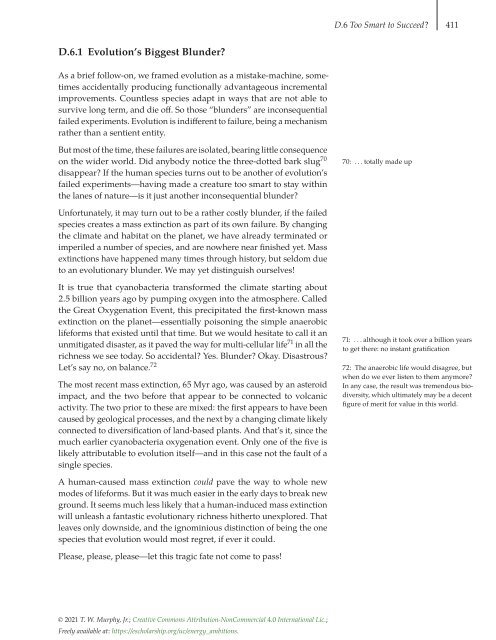Energy and Human Ambitions on a Finite Planet, 2021a
Energy and Human Ambitions on a Finite Planet, 2021a
Energy and Human Ambitions on a Finite Planet, 2021a
You also want an ePaper? Increase the reach of your titles
YUMPU automatically turns print PDFs into web optimized ePapers that Google loves.
D.6 Too Smart to Succeed? 411<br />
D.6.1 Evoluti<strong>on</strong>’s Biggest Blunder?<br />
As a brief follow-<strong>on</strong>, we framed evoluti<strong>on</strong> as a mistake-machine, sometimes<br />
accidentally producing functi<strong>on</strong>ally advantageous incremental<br />
improvements. Countless species adapt in ways that are not able to<br />
survive l<strong>on</strong>g term, <str<strong>on</strong>g>and</str<strong>on</strong>g> die off. So those “blunders” are inc<strong>on</strong>sequential<br />
failed experiments. Evoluti<strong>on</strong> is indifferent to failure, being a mechanism<br />
rather than a sentient entity.<br />
But most of the time, these failures are isolated, bearing little c<strong>on</strong>sequence<br />
<strong>on</strong> the wider world. Did anybody notice the three-dotted bark slug 70<br />
disappear? If the human species turns out to be another of evoluti<strong>on</strong>’s<br />
failed experiments—having made a creature too smart to stay within<br />
the lanes of nature—is it just another inc<strong>on</strong>sequential blunder?<br />
70: ...totally made up<br />
Unfortunately, it may turn out to be a rather costly blunder, if the failed<br />
species creates a mass extincti<strong>on</strong> as part of its own failure. By changing<br />
the climate <str<strong>on</strong>g>and</str<strong>on</strong>g> habitat <strong>on</strong> the planet, we have already terminated or<br />
imperiled a number of species, <str<strong>on</strong>g>and</str<strong>on</strong>g> are nowhere near finished yet. Mass<br />
extincti<strong>on</strong>s have happened many times through history, but seldom due<br />
to an evoluti<strong>on</strong>ary blunder. We may yet distinguish ourselves!<br />
It is true that cyanobacteria transformed the climate starting about<br />
2.5 billi<strong>on</strong> years ago by pumping oxygen into the atmosphere. Called<br />
the Great Oxygenati<strong>on</strong> Event, this precipitated the first-known mass<br />
extincti<strong>on</strong> <strong>on</strong> the planet—essentially pois<strong>on</strong>ing the simple anaerobic<br />
lifeforms that existed until that time. But we would hesitate to call it an<br />
unmitigated disaster, as it paved the way for multi-cellular life 71 in all the<br />
richness we see today. So accidental? Yes. Blunder? Okay. Disastrous?<br />
Let’s say no, <strong>on</strong> balance. 72<br />
The most recent mass extincti<strong>on</strong>, 65 Myr ago, was caused by an asteroid<br />
impact, <str<strong>on</strong>g>and</str<strong>on</strong>g> the two before that appear to be c<strong>on</strong>nected to volcanic<br />
activity. The two prior to these are mixed: the first appears to have been<br />
caused by geological processes, <str<strong>on</strong>g>and</str<strong>on</strong>g> the next by a changing climate likely<br />
c<strong>on</strong>nected to diversificati<strong>on</strong> of l<str<strong>on</strong>g>and</str<strong>on</strong>g>-based plants. And that’s it, since the<br />
much earlier cyanobacteria oxygenati<strong>on</strong> event. Only <strong>on</strong>e of the five is<br />
likely attributable to evoluti<strong>on</strong> itself—<str<strong>on</strong>g>and</str<strong>on</strong>g> in this case not the fault of a<br />
single species.<br />
71: . . . although it took over a billi<strong>on</strong> years<br />
to get there: no instant gratificati<strong>on</strong><br />
72: The anaerobic life would disagree, but<br />
when do we ever listen to them anymore?<br />
In any case, the result was tremendous biodiversity,<br />
which ultimately may be a decent<br />
figure of merit for value in this world.<br />
A human-caused mass extincti<strong>on</strong> could pave the way to whole new<br />
modes of lifeforms. But it was much easier in the early days to break new<br />
ground. It seems much less likely that a human-induced mass extincti<strong>on</strong><br />
will unleash a fantastic evoluti<strong>on</strong>ary richness hitherto unexplored. That<br />
leaves <strong>on</strong>ly downside, <str<strong>on</strong>g>and</str<strong>on</strong>g> the ignominious distincti<strong>on</strong> of being the <strong>on</strong>e<br />
species that evoluti<strong>on</strong> would most regret, if ever it could.<br />
Please, please, please—let this tragic fate not come to pass!<br />
© 2021 T. W. Murphy, Jr.; Creative Comm<strong>on</strong>s Attributi<strong>on</strong>-N<strong>on</strong>Commercial 4.0 Internati<strong>on</strong>al Lic.;<br />
Freely available at: https://escholarship.org/uc/energy_ambiti<strong>on</strong>s.


















